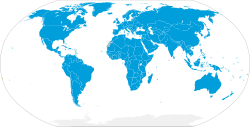It has been suggested that Criticism of the United Nations be merged into this article. (Discuss) Proposed since November 2024. |
 | |||||||
| Headquarters | 760 United Nations Plaza, Manhattan, New York City (international zone) | ||||||
| Official languages | |||||||
| Type | Intergovernmental organization | ||||||
| Membership | 193 member states 2 observer states | ||||||
| Leaders | |||||||
| António Guterres | |||||||
| Amina J. Mohammed | |||||||
| Philemon Yang | |||||||
| Bob Rae | |||||||
| Establishment | |||||||
• UN Charter signed | 26 June 1945 | ||||||
• Charter entered into force | 24 October 1945 | ||||||
| |||||||
The United Nations (UN) is a diplomatic and political[2] international organization with the intended purpose of maintaining international peace and security, developing friendly relations among nations, achieving international cooperation, and serving as a center for coordinating the actions of member nations.[3] It is widely recognised as the world's largest international organization.[4] The UN is headquartered in New York City, in international territory with certain privileges extraterritorial to the United States, and the UN has other offices in Geneva, Nairobi, Vienna, and The Hague, where the International Court of Justice is headquartered at the Peace Palace.
The UN was established after World War II with the aim of preventing future world wars, and succeeded the League of Nations, which was characterized as being ineffective.[5] On 25 April 1945, 50 nations assembled in San Francisco, California, for a conference and initialised the drafting of the UN Charter, which was adopted on 25 June 1945. The charter took effect on 24 October 1945, when the UN began operations. The UN's objectives, as outlined by its charter, include maintaining international peace and security, protecting human rights, delivering humanitarian aid, promoting sustainable development, and upholding international law.[6] At its founding, the UN had 51 member states; as of 2024[update], it has 193 sovereign states, nearly all of the world's recognized sovereign states.[7]
The UN's mission to preserve world peace was complicated in its initial decades due in part to Cold War tensions that existed between the United States and Soviet Union and their respective allies. Its mission has included the provision of primarily unarmed military observers and lightly armed troops charged with primarily monitoring, reporting and confidence-building roles.[8] UN membership grew significantly following the widespread decolonization in the 1960s. Since then, 80 former colonies have gained independence, including 11 trust territories that had been monitored by the Trusteeship Council.[9] By the 1970s, the UN's budget for economic and social development programmes vastly exceeded its spending on peacekeeping. After the end of the Cold War in 1991, the UN shifted and expanded its field operations, undertaking a wide variety of complex tasks.[8]
The UN comprises six principal operational organizations: the General Assembly, the Security Council, the Economic and Social Council, the International Court of Justice, the UN Secretariat, and the Trusteeship Council, although the Trusteeship Council has been suspended since 1994. The UN System includes a multitude of specialized agencies, funds, and programmes, including the World Bank Group, the World Health Organization, the World Food Programme, UNESCO, and UNICEF. Additionally, non-governmental organizations may be granted consultative status with the Economic and Social Council and other agencies.
The UN's chief administrative officer is the secretary-general, currently António Guterres, who is a Portuguese politician and diplomat. He began his first five-year term on 1 January 2017 and was re-elected on 8 June 2021. The organization is financed by assessed and voluntary contributions from its member states.
The UN, its officers, and its agencies have won multiple Nobel Peace Prizes, although other evaluations of its effectiveness have been contentious. Some commentators believe the organization to be a leader in peace and human development, while others have criticized it for ineffectiveness, bias, and corruption.
- ^ cite web |url=https://www.un.org/en/our-work/official-languages |title=Official Languages |archive-url=https://web.archive.org/web/20210713075145/https://www.un.org/en/our-work/official-languages |archive-date=13 July 2021 |website=United Nations |access-date=31 December 2021}}
- ^ "United Nations". HISTORY. 21 August 2018. Archived from the original on 23 March 2024. Retrieved 23 March 2024.
- ^ "Chapter I: Purposes and Principles". United Nations Charter. United Nations. Archived from the original on 18 March 2022. Retrieved 20 March 2022.
- ^ "International Organization". National Geographic Society. 23 December 2012. Archived from the original on 16 November 2020. Retrieved 24 October 2020.
- ^ "'The League is Dead. Long Live the United Nations.'". National WW2 Museum New Orleans. 19 April 2021. Archived from the original on 24 February 2022. Retrieved 10 March 2022.
- ^ "What We Do". United Nations. Archived from the original on 22 November 2018. Retrieved 22 November 2018.
- ^ Cite error: The named reference
UN_SouthSudan_193rd_statewas invoked but never defined (see the help page). - ^ a b "Our history". United Nations Peacekeeping. Archived from the original on 22 November 2018. Retrieved 22 November 2018.
- ^ "Decolonization". United Nations. Archived from the original on 22 November 2018. Retrieved 22 November 2018.

